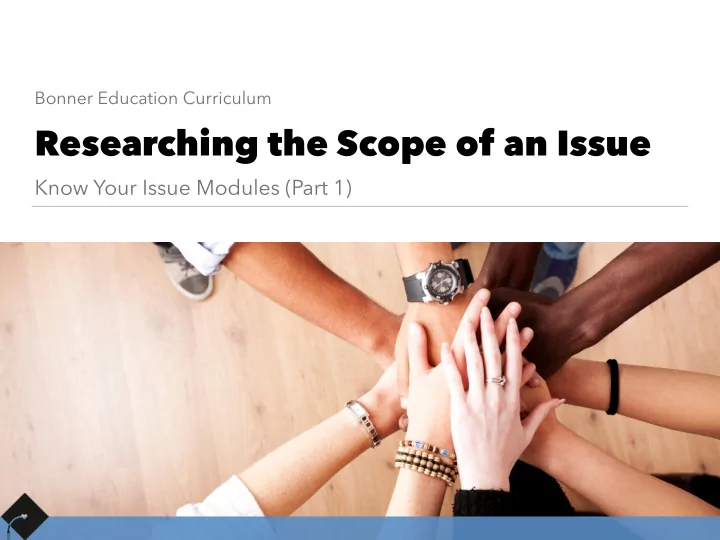

Bonner Education Curriculum Researching the Scope of an Issue Know Your Issue Modules (Part 1)
Workshop Goals: Understand the following: • How your chosen issue area affects the local community Skills: • Community-Based Research Methods • Publishing Information (through Bonner Wiki) Project Completion: • Understand the structure of an issue-brief
Workshop Agenda: 1. Introductions & Expectations 2. Narrowing Your Issue Area 3. Finalizing Your Topic 4. Issue Introduction Presentations 5. Initial Research 6. Reflections
What social justice issue(s) motivate you to take action and find solutions?
Know Your Issue Modules • Purpose: Provide Bonners with the ability to critically assess the scope of the issue area under which they serve by understanding impact of past and current policies For Bonner Students: • Outcomes: Understand the value that comes with compiling an issue brief. • Skills: Interview, Research, Writing
Know Your Issue Modules For National Network: • Outcomes: Information- sharing to the Bonner Network • Information : examples, opportunities • Improve services administered to local communities
What should students expect? The production and presentation of a finalized issue-brief. Example: Career Development Programs for Youth - Trenton, NJ
What is an Issue-Brief? Key Elements: • Focuses on a specific and local, community issue GOAL STATEMENT • Answers: SCOPE OF THE PROBLEM What is the nature/extent of PAST POLICY the issue? CURRENT POLICY What has been tried in the past to address it? MODEL PROGRAMS What is currently being done to address it? KEY ORG./INDIVIDUALS What are the different ways organizations/individuals BIBLIOGRAPHY are addressing the issue?
Break into Groups! Groups should be 2-3 individuals Similar service sites Similar interests in issue areas you serve under
Setting Expectations & Goals
Technology & Data-Sharing Expectations Stay on Topic: online pages should all be related to topics being discussed No emails, social media, homework, etc. Share all of the Data: Maintain group-determined data-sharing protocols Utilize Google Docs, Shared Pages, etc.
Technology & Data-Sharing Expectations Stay on Topic: online pages should all be related to topics being discussed Share all of the Data: Maintain group-determined data-sharing protocols What expectations will you set with your group? Discuss any other technology guidelines to set Discuss and decide data-sharing methods
Setting Goals with Groups Complete Issue-Brief
Setting Goals with Groups Complete Issue-Brief
Setting Goals with Groups Complete Issue-Brief
Setting Goals with Groups Complete Issue-Brief
Setting Goals with Groups Complete Issue-Brief
Setting Goals with Groups Complete Issue Brief What goals will you set with your group? Discuss: What do we want to accomplish? What do we want to learn? Who would we want to meet during this time? What organizations do we look forward to understanding more? What long-term impact do we hope this issue-brief may be able to accomplish?
Choosing and Narrowing Your Issue
Choosing & Narrowing Your Issue Goal Statements/ Issue-Brief Topics: • Must be created to frame and give purpose to you research. • Establish goals as a response to the overall issue and solution-oriented . What is my group’s overall issue area? Starting Issue:
Choosing & Narrowing Your Issue Discuss Your Issue Brief Topic: Is my topic real? Does my topic matter to someone? Who? Will it be useful to do research and collect data on this topic? Why? Does this topic allow for community members to provide feedback?
Choosing & Narrowing Your Issue Example Topics: • Career Development Programs for Youth • Increasing Child Care Subsidies for Neighborhood Residents • Preventative Health Services for Low-Income Residents
Choosing & Narrowing Your Issue Example: What is my overall issue area? Starting Issue: Rights of Psychological effects Immigration Undocumented of immigration Workers Poverty status of Path to citizenship College Access for immigrant youth Immigrant youth DACA Awareness & Bipartisan Immigration Reform
Choosing & Narrowing Your Issue Example: What is my overall issue area? Starting Issue: Education Transportation Access Poverty / The Working Poor Opportunities & Availability Healthcare Access Neighborhood Crime Housing Security Reduction “Developing Transportation for The Working Poor”
Choosing & Narrowing Your Issue Example: What is my overall issue area? Starting Issue: Environmental Environmental Topics Recycling/Trash Media Urban Sprawl Water Quality Industrial/ Environmental Fracking Consumer Movement Influence “Regulating Fracking in NWGA”
Issue Introduction Presentations
Issue Introduction Presentations Each group will (5 minutes) present on their chosen topic. Everyone will (3 minutes) provide feedback. How did you finalize your topic?
Conducting Research
Conducting Research Follow this process when researching: My Issue at the My Issue in National Level Past/Present My Issue at the My Issue in State Level Past/Present My Issue at the My Issue in Local Level Past/Present
Reflections: • What new information did I learn? • What direction would we like future research to go in? •What information do we hope to discover next time? •What do we need to work on before the next meeting?
Next Up - Know Your Issue Part 2 - Researching Current Programs and Policies
Recommend
More recommend